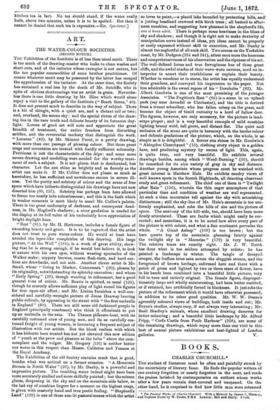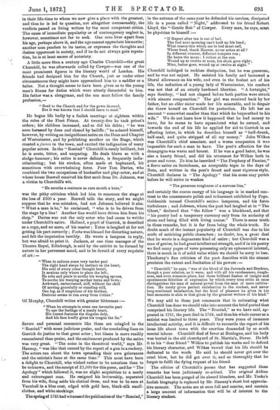BOOKS.
CHARLES CHURCHILL* THE student of literature must be often and painfully struck by the uncertainty of literary fame. He finds the popular writers of one century forgotten or nearly forgotten in the next, and reads- the praises lavished by contemporaries on authors whose works after a few years remain dust-covered and unopened. On the other hand, he is surprised to find how little man were esteemed
• The Poetical Works of Charles Churchill. With a Memoir by James L. Hatut‘y,. and Copious Notes by W. Tooke, F.R.S. London: Bell and Daldy. 2 vole.
in their life-time to whom we now give a place with the greatest, and thus he is led to question, not altogether unreasonably, the verdicts passed on living writers by the most competent critics. Tho cause of immediate popularity or of contemporary neglect is, however, sometimes not far to seek. One man lives apart from his age, perhaps above it, and the age cannot appreciate his merits ; another man panders to its tastes, or expresses the thoughts and desires uppermost in society, and if he do not always gain reputa- tion, he is at least secure of notoriety.
A little more tlra.n a century ago Charles Churchill—the great Churchill, he was afterwards called by Cowper—was one of the most prominent figures in the literary world of London. His friends had designed him for the Church, just as under other circumstances they might have apprenticed him to a saddler or a tailor. Not a thought seems to have been given as to the young man's fitness for duties which were utterly distasteful to him. His father was a clergyman, and the son must follow the family profession,—
"Bred to the Church and for the gown decreed, Ere it was known that I should learn to read."
He began life badly by a foolish marriage at eighteen within the rules of the Fleet Prison. At twenty-five he took priest's orders ; his children increased, and so did his debts ; "he was soon harassed by duns and chased by bailiffs ;" he solaced himself, however, by writing an insignificant satire on the Dean and Chapter of Westminster, and by publishing another on the Stage, which created a furore in the town, and excited the indignation of many popular actors. In the " Rosciad " Churchill is rarely brilliant, but he is acute, bitter, and unsparing. He deals blows as with a
sledge-hammer ; his satire is never delicate, is frequently indiscriminating; but his strokes, often made at haphazard, hit
sometimes with overwhelming force. Poor Tom Davies, who combined the two occupations of bookseller and play-actor, and at whose house Boswell received his first snub from Dr. Johnson, was a victim to Churchill's wit.
"He months a sentence as cars mouth a bone," was the pithy criticism which led him to renounce the stage at the loss of /500 a year. Boswell tells the story, and we might suppose that he was mistaken, had not Johnson believed it also. "What a man is he," he exclaimed, "who is to be driven from the stage by a line ! Another line would have driven him from his shop." Davies was not the only actor who had cause to writhe under Churchill's satire. Holland, a pupil of Garrick, is described as a copy, and no more, of his master ; Yates is laughed at for not getting his part correctly ; Foote was blamed for distorting nature, and felt the imputation terribly. He wrote a lampoon in reply, but was afraid to print it. Jackson, at one time manager of the Theatre Royal, Edinburgh, is said by the satirist to be formed by nature in her perversest mood, and to be devoid of every requisite of art :—
"When to enforce some very tender part The right hand sleeps by instinct on the heart, His soul of every other thought bereft, Is anxious only where to place the left ; He sobs and pants to soothe his weeping spouse, To soothe his weeping mother turns and bows: Awkward, embarrassed, stiff, without the skill Of moving gracefully or standing still, One leg, as if suspicious of his brother, Desirous seems to run away from Vother."
Of Murphy, Churchill writes with greater bitterness :— " When he attempts in some one favourite part To ape the feelings of a manly heart,
His honest features the disguise defy,
And his face loudly gives his tongue the lie."
Severe and personal comments like these are mingled in the " Rosciad" with some judicious praise, and the concluding lines on Garrick do justice to that great actor ; but blame is more readily remembered than praise, and the excitement produced by the satire was very great. "The noise in the theatrical world," says Mr. Hannay, "was like that caused by the report of a gun in a rookery. The actors ran about the town spreading their own grievances and the satirist's fame at the same time." This must have been a delight to Churchill, who wished rather to be notorious than to be unknown, and the receipt of £1,000 for this poem, and for "The Apology" which followed it, was no slight acquisition to a needy and extravagant man. He resigned his lectureship, separated from his wife, flung aside his clerical dress, and was to be seen at Vauxhall in a blue coat, edged with gold lace, black-silk small- clothes, and white stockings.
The spring of 1761 had witnessed the publication of the "Bowled," in the autumn of the same year he defended his careless, dissipated life in a poem called "Night," addressed to his friend Robert Lloyd, the "Gentle Bob" of Cowper. Every man, he says, mast. be physician to himself :—
"If Rupert after ten is out of bed,
The fool next morning can't hold up his head; What reason this which me to bed must call, Whose head, thank Heaven, never aches at all ? In different courses, different tempers run ; He hates the moon : I sicken at the sun. Wound up at twelve at noon, his clock goes right; Mine, better goes, wound up at twelve at night."
Churchill indulged in reckless dissipation, but he was generous, and he was not unjust. He assisted his family and bestowed a liberal allowance on his wife, and even in the foulest act of his
life, the seduction of a young lady of Westminster, his conduct was not that of an utterly hardened libertine. "A fortnight," says Southey, "had not elapsed before both parties were struck with sincere compunction." The girl was received back by her father, but an elder sister made her life miserable, and in despair she threw herself on Churchill for protection. He left her an amount "somewhat smaller than that which he bequeathed to his
wife." We do not learn how it happened that he bad money to leave, for he seems to have squandered what he earned, and towards the end of his life he applied for aid to Garrick in an affecting letter, in which be describes himself as "half-drunk, half-mad, and quite stripped of all my money." John Wilkes was Churchill's chief associate, and a worse companion it Wit& impossible for such a man to have. The poet's affection for the
demagogue was warm and honest. If he was a good hater, he was also a hearty friend, and did his uttermost for Wilkes both in prose and verse. To him he inscribed "The Prophecy of Famine," a fierce satire on Scotchmen, an acceptable topic in the days of Bute, and written in the poet's freest and most vigorous style.. Churchill declares in "The Apology" that his muse may perish before he will strive to weaken
"The generous roughness of a nervous line," and certainly the coarse energy of his language is in marked con- trast to the consummate polish and refinement exhibited by Pope. Goldsmith termed Churchill's satires lampoons, and his force
turbulence ; and Johnson, whom the poet had laughed at in "The Ghost," declared that "the fellow" was a blockhead, and that "his poetry had a temporary currency only from its audacity of abuse and being filled with living names." There is some truth in these remarks, but it is far from being the whole truth. No doubt much of the instant popularity of Churchill was due to his mode of satirizing public characters ; no doubt, too, a great deal that he wrote is a degenerate kind of satire ; but Churchill was a man of genius, he had great intellectual strength, and if in his poetry we find many pages of verse possessing only an ephemeral interest, there is much in it of solid value which we should be sorry to lose.
Thackeray's fine criticism of the poet describes with the utmost. precision the extent and limitation of his powers :—
" Churchill," he says, "was of the blood of the Javenals and Drydens, though a poor relation, as it were; and with all his carelessness, rough- ness and even common-place, has those brilliant flashes of insight and spontaneous felicities of expression by which every true critic at onoa distinguishes the man of natural power from the man of mere cultiva- tion. He rarely gives perfect satisfaction to the student, and never- long-continued satisfaction, but the kind of pleasure he gives in his best moments is akin to that given by the greatest writers of his kind."
We may add to these just comments that in estimating what Churchill has doge we should take into account the brief period that comprised his literary life. The " Rosciad," as we have said, ap- peared in 1761, the poet died in 1764, and thus his whole career as a satirist was limited to three years. They were years of immense intellectual activity, and it is difficult to reconcile the report of his loose life about town with the exertion demanded by so much mental labour. Churchill died of fever at Boulogne, and his body was buried in the old churchyard of St. Martin's, Dover. He left it to his "dear friend" Wilkes to publish his works and to defend
his literary character, aad Wilkes vowed that his life should be dedicated to the worUt He said he should never get over the blow, but he did get over it, and so thoroughly that he
forgot to fulfil the dying request of his friend.
The edition of Churchill's poems that has suggested these- remarks has been judiciously re-edited. The original Aldine Churchill has been purged of its absurd blunders, and Mr. Tooke's foolish biography is replaced by Mr. Hannay's short but apprecia- tive memoir. The notes are at once full and concise, and contain a large amount of information that will be of interest to the literary student.



































 Previous page
Previous page